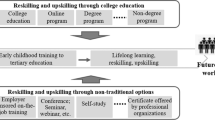Abstract
As suggested by human capital theory, workers with flexible contracts participate less often in training than those with permanent contracts. We find that this is merely due to the fact that flexworkers receive less employer-funded training, a gap they can only partly compensate for by their own training investments. Flexworkers particularly participate less in firm-specific training that is meant to keep up with new skill demands than workers with permanent contracts. However, for those who participate in employer-funded firm-specific training, a temporary contract appears to facilitate the transition to a permanent contract with the same employer. However, this does not hold for participation in self-paid training. This training, which is usually general training, does not help in finding a better job.
Article PDF
Similar content being viewed by others
Avoid common mistakes on your manuscript.
References
Acemoglu D., Pischke J.-S. (1998) Why do firms train? Theory and evidence. Quarterly Journal of Economics 113(1): 79–119
Albert C., García-Serrano C., Hernanz V. (2005) Firm-provided training and temporary contracts. Spanish Economic Review 7(1): 67–88
Allen J., De Grip A. (2012) Skill obsolescence, lifelong learning and labor market participation. Applied Economics 44(25): 3237–3245 (forthcoming)
Almeida-Santos, F., & Mumford, K. (2004). Employee training in Britain. IZA discussion paper, no 1197.
Arranz J., García-Serrano C., Toharia L. (2010) The influence of temporary employment on unemployment exits in a competing risks framework. Journal of Labor Research 31(1): 67–90
Arulampalam W., Booth A. (1998) Training and labour market flexibility: Is there a trade-off?. British Journal of Industrial Relations 36(4): 521–536
Autor D. (2001) Why do temporary help firms provide free general skills training?. Quarterly Journal of Economics 116(4): 1409–1448
Barron J., Black D., Loewenstein M. (1989) Job matching and on-the-job training. Journal of Labor Economics 7(1): 1–19
Bassanini A., Booth A., Brunello G., De Paola M., Leuven E. (2007) Workplace training in Europe. In: Brunello G., Garibaldi P., Wasmer E. (eds) Education and training in Europe. Oxford University Press, Oxford, pp 143–309
Becker G. (1975) Human capital: A theoretical and empirical analysis, with special reference to education (2nd ed.). National Bureau of Economic Research, New York
Bierings H., Cörvers F., Montizaan R., de Vries R. (2009) Bruikbaarheid longitudinale gegevens Enquête Beroepsbevolking. ROA-TR-2009/2. ROA, Maastricht
Booth, A. L., & Chatterji, M. (1995). Training and contracts. Dundee discussion papers in economics, no 64.
Booth A. L., Francesconi M., Frank J. (2002) Temporary jobs: Stepping-stones or dead ends?. Economic Journal 112(480): F189–F213
Booth A. L., Snower D. J. (1996) Acquiring skills, market failures, their symptoms and policy response. Cambridge University Press, Cambridge
Crawford V. P. (1988) Long-term relationships governed by short-term contracts. American Economic Review 78(3): 485–499
Crawford V. P. (1990) Relationship-specific investment. Quarterly Journal of Economics 105(2): 561–574
De Graaf-Zijl M., van den Berg G., Heyma A. (2010) Stepping stones for the unemployed: The effect of temporary jobs on the duration until (regular) work. Journal of Population Economics 24(1): 107–139
Dekker R. (2007) Non-standard employment and mobility in the Dutch, German and British labour market. Ridderprint, Ridderkerk
Denktank Leren en Werken. (2009). Tijd voor ontwikkeling. Advies van de Denktank Leren en Werken over het stimuleren van een leven lang leren in Nederland. Den Haag: Ministeries van Onderwijs, cultuur en Wetenschap en sociale Zaken en Werkgelegenheid.
Draca M., Green C. (2004) The incidence and intensity of employer funded training: Australian evidence on the impact of flexible work. Scottish Journal of Political Economy 51(5): 609–625
Fouarge D., Schils T., de Grip A. (2009) Prikkels voor postinitiële scholing van laagopgeleiden. ECBO, Den Bosch
Forrier A., Sels L. (2003) Temporary employment and employability: Training opportunities and efforts of temporary and permanent employees in Belgium. Work, Employment and Society 17(4): 641–666
Glassner, V., & Galgóczi, B. (2009). Plant-level responses to the economic crisis in Europe. ETUI WP 2009.01
Goux D., Maurin E. (2000) Returns to firm-provided training: Evidence from French worker firm-matched data. Labor economics 7(1): 1–19
Jonker, N., & de Grip, A. (1999). Do employees with flexible contracts receive less training? ROA Research Memoranda, ROA-RM-1999/1E.
Katz E., Ziderman A. (1990) Investment in general training: The role of information and labour mobility. Economic Journal 100(403): 1147–1158
Kerkhofs, M., Bierings, H., & de Vries, R. (2009). Werkloosheidsduren op basis van de Enquête Beroepsbevolking, 2002–2007. Den Haag/Heerlen: CBS.
Lazear E.P. (2009) Firm-specific human capital: A skill-weights approach. Journal of Political Economy 117(5): 914–940
Lee C. H., Bruvold N. T. (2003) Creating value for employees: Investment in employee development. International Journal of Human Resource Management 14(6): 981–1000
Loewenstein M. A., Spletzer J. R. (1997) Delayed formal on-the-job training. Industrial and Labor Relations Review 51(1): 82–99
Lynch L. (1993) The economics of youth training in the United states. The Economics Journal 103(420): 1292–1302
Murphy P., Latreille P., Jones M., Blackaby D. (2008) Is there a public sector training advantage? Evidence from the workplace employment relations survey. British Journal of Industrial Relations 46(4): 674–701
OECD: (2004) Employment outlook 2004. OECD, Paris
Parent D. (1999) Wages and mobility: the impact of employer-provided training. Journal of labor economics 17(2): 298–317
Pischke J. (2001) Continuous training in Germany. Journal of Population Economics 14(3): 523–548
Stevens M. (1994) An investment model for the supply of training by employers. Economic Journal 104(424): 556–570
Acknowledgments
The authors would like to thank Ahmed Elsayed, Olivier Marie, and anonymous referees from De Economist for their useful comments.
Open Access
This article is distributed under the terms of the Creative Commons Attribution Noncommercial License which permits any noncommercial use, distribution, and reproduction in any medium, provided the original author(s) and source are credited.
Author information
Authors and Affiliations
Corresponding author
Rights and permissions
Open Access This is an open access article distributed under the terms of the Creative Commons Attribution Noncommercial License (https://creativecommons.org/licenses/by-nc/2.0), which permits any noncommercial use, distribution, and reproduction in any medium, provided the original author(s) and source are credited.
About this article
Cite this article
Fouarge, D., de Grip, A., Smits, W. et al. Flexible Contracts and Human Capital Investments. De Economist 160, 177–195 (2012). https://doi.org/10.1007/s10645-011-9179-0
Published:
Issue Date:
DOI: https://doi.org/10.1007/s10645-011-9179-0




